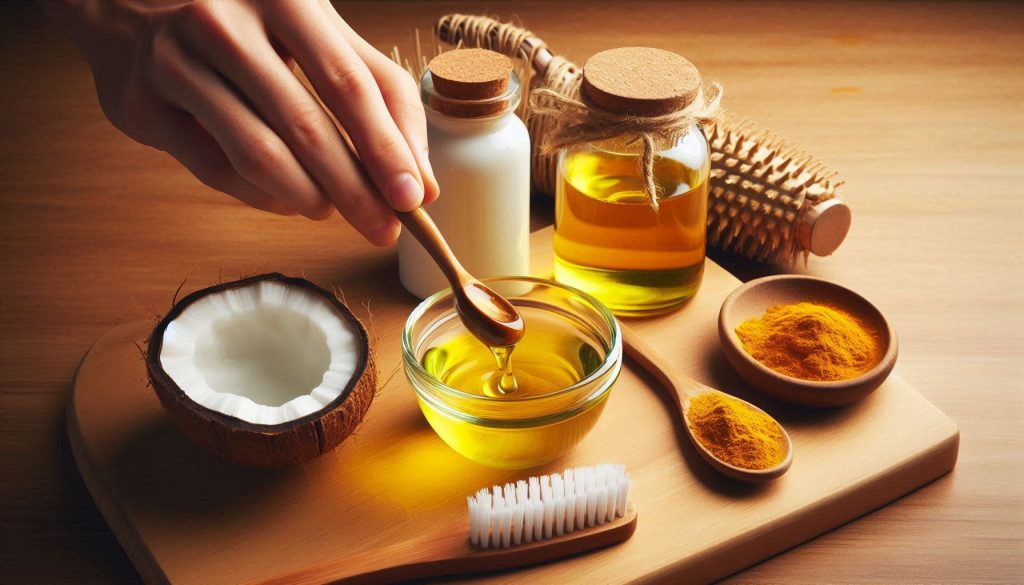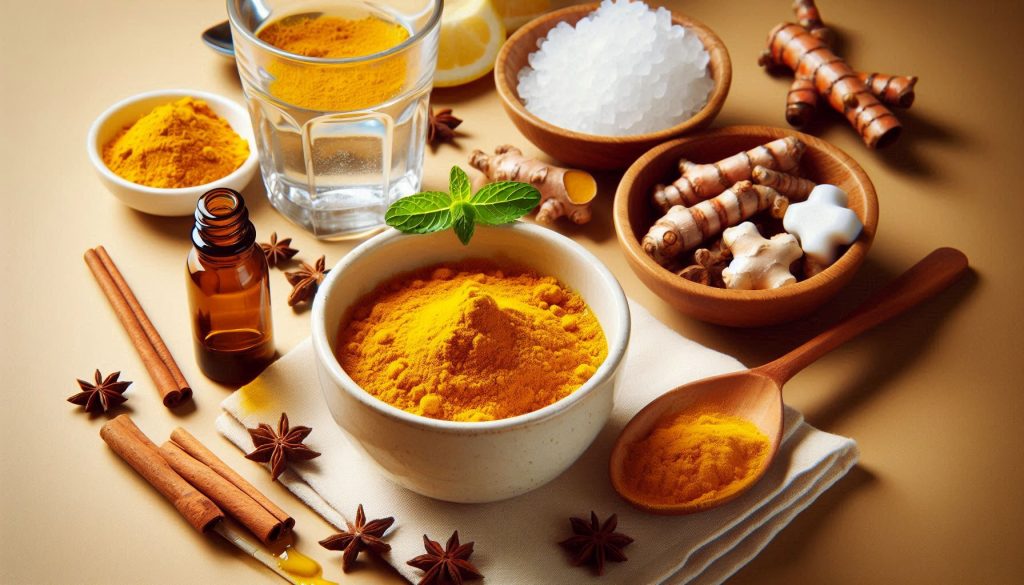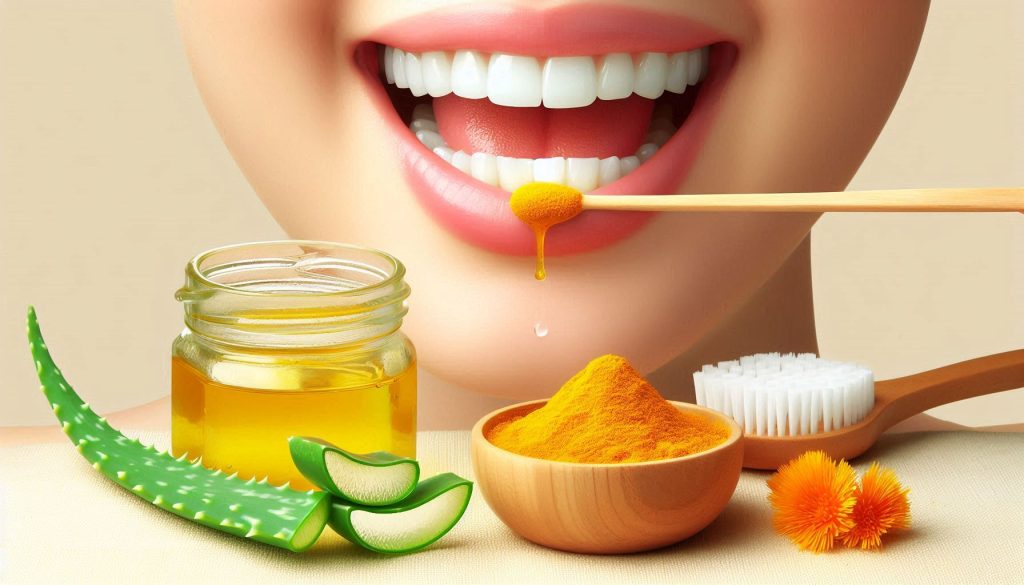Turmeric, a vibrant golden spice commonly used in both medicine and cooking, is now gaining attention in the world of dental health. Known for its potent anti-inflammatory, antibacterial, and antioxidant properties, turmeric has long been a staple in traditional medicine. Recent research, along with anecdotal evidence, suggests that this ancient herb may also offer powerful benefits for maintaining optimal oral health.

The Health Benefits of Turmeric for Oral Health
Curcumin: The Ultrapowerful Ingredient
The main active ingredient in turmeric, curcumin, is responsible for many of its health advantages. Because of its potent anti-inflammatory and antibacterial qualities, curcumin is well-known for being an excellent choice for dental health. Curcumin relieves sensitive tissues and gum problems by decreasing inflammation. Because of its antibacterial properties, it fights nasty germs in the mouth and helps stop cavities, gum disease, and foul breath.
Key Benefits of Turmeric for Oral Care
- Anti-Inflammatory Power: Gingivitis, or inflammation of the gums, is a common condition that, if neglected, can progress to more serious periodontal disease. Turmeric is a useful supplement to oral hygiene regimens because of its anti-inflammatory qualities, which can help lessen gum swelling and bleeding.
- Antimicrobial Activity: The antibacterial properties of curcumin can support good dental hygiene. Turmeric keeps the mouth fresh and clean by preventing the formation of bacteria that produce plaque and bad breath.
- Antioxidant Advantages: Turmeric’s antioxidant effects protect the gums and teeth from oxidative stress, a condition that can worsen oral issues. This protective action helps maintain a healthy environment for your mouth.
Incorporating Turmeric into Your Dental Routine
There are several easy and effective ways to include turmeric in your oral care regimen. Here are some DIY remedies you can try at home:
1. Turmeric Toothpaste
How To Apply:
Ingredients:
- 1 tablespoon coconut oil
- 1 teaspoon turmeric powder
- A pinch of baking soda (Optional)
Instructions:
- Combine coconut oil and turmeric powder to make a smooth paste.
- For a more abrasive effect, add a small amount of baking soda.
- Apply the paste to your toothbrush.
- Brush your teeth as usual, ensuring all surfaces of your teeth and gums are cleaned.
- Rinse your mouth thoroughly with water.
- To prevent excessive turmeric buildup and potential stains, use this paste two to three times a week.

Why It Works: Coconut oil, like turmeric, has antibacterial and anti-inflammatory properties. Baking soda can gently remove surface stains, making this a powerful natural toothpaste.
Benefits: Turmeric toothpaste can reduce plaque, fight bacteria, and ease gum irritation. The mild abrasiveness of the paste helps clean teeth gently.
2. Turmeric Oil Pulling
How To Apply:
Ingredients:
- 1 tablespoon coconut oil
- 1/4 teaspoon turmeric powder
Instructions:
- Blend 1 tablespoon of coconut oil with 1/4 teaspoon of turmeric powder until thoroughly mixed.
- Swish the mixture around your mouth, ensuring it reaches all areas, for 10 to 15 minutes.
- Expel the oil from your mouth.
- Rinse your mouth with warm water.
- Follow up with your regular brushing routine.
- Perform oil pulling once a day, preferably in the morning before eating or drinking.

Why It Works: The swishing action of oil pulling helps remove bacteria, while turmeric and coconut oil work together to reduce inflammation and improve gum health.
Benefits: Combining coconut oil and turmeric for oil pulling can reduce oral bacteria, improve gum health, and enhance overall oral hygiene.
3. Turmeric Mouthwash
How To Apply:
Ingredients:
- 1/2 teaspoon turmeric powder
- 1 cup warm water
- A few drops of peppermint oil (Optional)
Instructions:
- Mix 1/2 teaspoon of turmeric powder with a cup of warm water until dissolved.
- (Optional) Add a few drops of peppermint oil for flavor.
- Swish the solution around your mouth for 30 to 60 seconds.
- Spit out the mouthwash and rinse your mouth with regular water.
- Use this mouthwash daily if needed.

Why It Works: This mouthwash reduces bacteria and inflammation, while the peppermint oil provides a refreshing flavor.
Benefits: A turmeric-based mouthwash helps promote fresh breath, fight bacteria, and reduce gum inflammation.
4. Turmeric and Aloe Vera Gel for Gum Health
How To Apply:
Ingredients:
- 1 tablespoon aloe vera gel
- 1 teaspoon turmeric powder
Instructions:
- Blend 1 tablespoon of aloe vera gel with 1 teaspoon of turmeric powder until well combined.
- Using a clean cotton swab or your finger, apply the mixture to your gums.
- Let it sit for 5 to 10 minutes.
- Rinse your mouth with warm water.
- Use this treatment 2 to 3 times a week to reduce gum irritation and maintain good dental hygiene.

Why It Works: The anti-inflammatory benefits of turmeric are complemented by aloe vera’s soothing and healing properties, making this a great remedy for gum health.
Benefits: Combining turmeric with aloe vera gel helps reduce gum inflammation and offers antimicrobial protection.
5. Turmeric and Baking Soda for Teeth Whitening
How To Apply:
Ingredients:
- 1 teaspoon baking soda
- 1 teaspoon turmeric powder
- A little water
Instructions:
- Combine 1 teaspoon of baking soda with 1 teaspoon of turmeric powder and enough water to make a paste.
- Apply the paste to your toothbrush.
- Gently brush your teeth with the paste.
- Rinse your mouth thoroughly with water.
- Use this treatment just once a week to avoid damaging enamel from overuse.
Why It Works: Baking soda acts as a mild abrasive, while turmeric helps maintain oral health and enhance the whitening process.
Benefits: Baking soda and turmeric together can help whiten teeth and remove surface stains.
Combining Turmeric with Other Herbal Remedies
1. Neem and Turmeric
Benefits: The antimicrobial properties of neem enhance the health benefits of turmeric. Together, neem and turmeric improve gum health and help manage plaque effectively.
How to Use:
- For Toothpaste or Mouthwash: Mix neem powder into your turmeric toothpaste or mouthwash to boost its antibacterial properties.
- Alternative: Combine turmeric-based remedies with neem twigs or neem-based toothpaste for additional benefits.
2. Clove and Turmeric
Benefits: Turmeric’s anti-inflammatory qualities combined with clove’s analgesic effects work synergistically to relieve gum and toothache pain.
How to Use:
- Combine a few drops of clove oil with your turmeric paste.
- Apply the mixture directly to the affected areas, such as aching gums, for pain relief.
Tips for Using Turmeric in Oral Care
- Staining: Turmeric can temporarily stain teeth. To prevent this, clean your teeth thoroughly and rinse your mouth well after using turmeric-based products.
- Patch Test: If you have sensitive skin or gums, perform a patch test before using turmeric extensively to ensure you do not have an allergic reaction.
- Consult Your Dentist: Before adding any new treatments to your oral hygiene routine, especially if you use other products or have existing dental issues, consult your dentist.
- Consistency: While turmeric offers many benefits, it should be used alongside traditional oral hygiene practices such as regular brushing, flossing, and dental checkups.
Additional Oral Care Practices
- Brush Twice Daily: Brush your teeth at least twice a day with a soft-bristled toothbrush and fluoride toothpaste.
- Floss Daily: Floss daily to remove plaque and food particles from between teeth and along the gum line.
- Regular Dentist Visits: Schedule regular cleanings and checkups with your dentist to monitor and maintain your oral health.
- Healthy Diet: Eat a balanced diet rich in whole grains, fruits, and vegetables. Limit acidic and sugary foods to prevent tooth decay.
Conclusion
The use of turmeric in dental care is evidence of the effectiveness of herbal medicines in preserving health and wellbeing. It is a beneficial addition to your dental hygiene regimen because of its anti-inflammatory, antibacterial, and antioxidant characteristics. You may improve the way you brush your teeth and encourage better oral health by adding turmeric to a variety of DIY solutions. Recall that even though turmeric has numerous advantages, conventional dental procedures should still be followed in addition to using it. Maintaining a healthy smile requires frequent dental appointments, a nutritious diet, and consistent oral cleanliness. Turmeric can be a natural ally in your quest for the best possible oral health if you use the appropriate strategy.
SOURCES
WebMD LLC – What to Know About Turmeric in Dental Care
Health line – Can You Use Turmeric for Teeth Whitening?
Dr Roland Dental – Turmeric Benefits for Oral Health
Enclave Dental – Is Turmeric Good for Dental Health?
DR.ROZE Dental Clinic – HARNESSING NATURE’S GOLD: 5 REMARKABLE WAYS
HISTORY
Current Version
September 5, 2024
Written By:
SUMMIYAH MAHMOOD